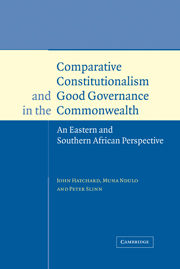 Comparative Constitutionalism and Good Governance in the Commonwealth
Comparative Constitutionalism and Good Governance in the Commonwealth Book contents
- Frontmatter
- Contents
- Preface
- List of cases
- List of constitutions
- List of statutes
- List of other instruments
- Map
- Introduction
- 1 The democratic state in Africa: setting the scene
- 2 Constitutions and the search for a viable political order
- 3 Devising popular and durable national constitutions: the new constitutions of the 1990s
- 4 Perfecting imperfections: amending a constitution
- 5 Presidentialism and restraints upon executive power
- 6 Enhancing access to the political system
- 7 Making legislatures effective
- 8 The judiciary and the protection of constitutional rights
- 9 The devolution of power to local communities
- 10 Developing autochthonous oversight bodies: human rights commissions and offices of the ombudsman
- 11 Seeking constitutional control of the military
- 12 Constitutionalism and emergency powers
- 13 Constitutional governance: the lessons from southern and eastern experience
- Bibliography
- Index
12 - Constitutionalism and emergency powers
Published online by Cambridge University Press: 23 June 2009
- Frontmatter
- Contents
- Preface
- List of cases
- List of constitutions
- List of statutes
- List of other instruments
- Map
- Introduction
- 1 The democratic state in Africa: setting the scene
- 2 Constitutions and the search for a viable political order
- 3 Devising popular and durable national constitutions: the new constitutions of the 1990s
- 4 Perfecting imperfections: amending a constitution
- 5 Presidentialism and restraints upon executive power
- 6 Enhancing access to the political system
- 7 Making legislatures effective
- 8 The judiciary and the protection of constitutional rights
- 9 The devolution of power to local communities
- 10 Developing autochthonous oversight bodies: human rights commissions and offices of the ombudsman
- 11 Seeking constitutional control of the military
- 12 Constitutionalism and emergency powers
- 13 Constitutional governance: the lessons from southern and eastern experience
- Bibliography
- Index
Summary
There may come a time in the life of a nation when a situation arises that seriously threatens its security or stability. In response, a government may legitimately declare a state of emergency and make emergency regulations designed to counter the danger. Article 4 of the International Covenant on Civil and Political Rights (ICCPR) recognises that ‘in time of public emergency which threatens the life of the nation’ a state may take measures derogating from its obligations under the Covenant. The real concern arises from the potential abuse of emergency powers: for example, where an unscrupulous government declares a state of emergency in order to maintain itself in power, then suspends or abrogates key constitutional provisions and effectively rules by decree, for an indefinite period. This is a scenario that is aptly called the ‘permanence of the temporary’ and calls for the development of effective constitutional safeguards against such abuse of power. This issue is examined in the first part of the chapter. A frequent companion of a state of emergency is the use of preventive detention and this area is considered in the second part of the chapter.
States of emergency
During the colonial period, states of emergency were imposed in Kenya, Northern Rhodesia, Southern Rhodesia and Nyasaland as efforts were made to retain political and economic control and to stem the tide of African nationalism.
- Type
- Chapter
- Information
- Comparative Constitutionalism and Good Governance in the CommonwealthAn Eastern and Southern African Perspective, pp. 276 - 307Publisher: Cambridge University PressPrint publication year: 2004
